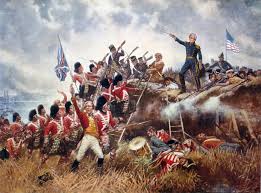
The battle of New Orleans was the greatest American victory of the War of 1812 and it wasn’t even fought during the war itself. The Americans and British signed a peace treaty at Ghent to end the war on Christmas Eve, 1814. News travelled slowly in those days and American general Andrew Jackson and British general Edward Packenham in Louisiana didn’t receive the news of the end of the war until it was too late. For Packenham and many of his British troops this would prove fatal. The battle was almost as lopsided as they come. Jackson suffered only thirteen fatalities while Packenham had over two thousand casualties-killed, wounded, and captured.
The battle was fought on January 8, 1815 around New Orleans, Louisiana. Jackson commanded a motley crew of American regulars, local irregulars, and even French pirates under Jean Lafitte. Packenham attacked Jackson’s troops who were fortified behind breastworks. Assault after assault failed to dislodge the Americans from their fortifications. Packenham was shot from his horse by cannon fire and was fatally wounded. The British were able to gain a foothold on the west bank of the Mississippi River but soon were forced to abandon even this. The casualties for the British were disastrous. The British withdrew and briefly besieged Fort St. Phillip unsuccessfully. By the time the news of peace had come the British withdrew to the West Indies without Edward Packenham and another British general Samuel Gibbs.
Jackson, on the other hand, returned home, a war hero. He gained great popularity and was eventually elected president in 1828. His greatest victory however, didn’t count in the war since it was technically fought after the war was over. This didn’t really matter. New Orleans did count. To the Americans and to the rest of the world this battle demonstrated the fortitude and strength of the Americans and their will to defend their liberty at all costs. In 1823, President James Monroe established the Monroe Doctrine which forbade European powers from colonizing or overpowering North and South American nations. (As an aside, the doctrine was really the brainchild of John Quincy Adams, Monroe’s vice-president so to be fair it should be called the “Adams Doctrine”.) The victory at New Orleans enabled Monroe (and Adams) to assert American independence so boldly. America had fought to retain their freedom and they had won. Doubtless the British, or any other European power for that matter, would want to entangle themselves in American affairs again after witnessing what happened to Packenham and his British troops on the battlefield of New Orleans.
